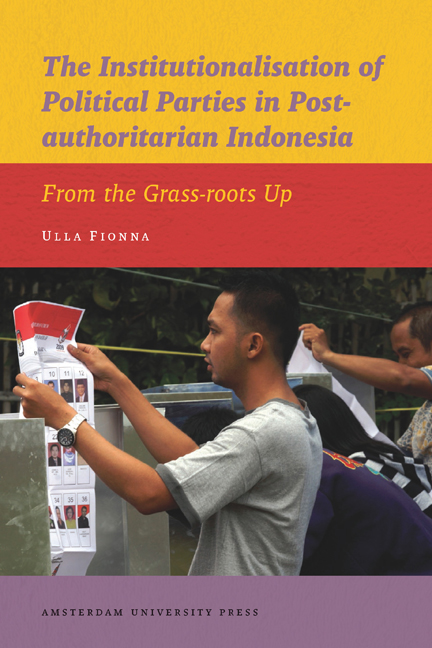 The Institutionalisation of Political Parties in Post-authoritarian Indonesia
The Institutionalisation of Political Parties in Post-authoritarian Indonesia Book contents
- Frontmatter
- Dedication
- Contents
- Preface
- Acknowledgements
- 1 The Question of Institutionalisation
- 2 Genesis of Modern Political Organisation in Indonesia
- 3 Diminishing Grass-roots Influence during the New Order
- 4 Party Organisation
- 5 Party Activities
- 6 Recruitment Approaches
- 7 Members’ Motivations and Participation in the Parties
- 8 Party Career and Intra-party Democracy
- 9 Progress of Party Institutionalisation and Its Role in Indonesia’s Democratisation
- Glossary
- Notes
- Bibliography
- Index
- Miscellaneous Endmatter
3 - Diminishing Grass-roots Influence during the New Order
Published online by Cambridge University Press: 28 January 2021
- Frontmatter
- Dedication
- Contents
- Preface
- Acknowledgements
- 1 The Question of Institutionalisation
- 2 Genesis of Modern Political Organisation in Indonesia
- 3 Diminishing Grass-roots Influence during the New Order
- 4 Party Organisation
- 5 Party Activities
- 6 Recruitment Approaches
- 7 Members’ Motivations and Participation in the Parties
- 8 Party Career and Intra-party Democracy
- 9 Progress of Party Institutionalisation and Its Role in Indonesia’s Democratisation
- Glossary
- Notes
- Bibliography
- Index
- Miscellaneous Endmatter
Summary
After the attempted coup, allegedly by the PKI, in 1965, Suharto took control and in 1966 he became Indonesia's second president. During the period of his administration, known as the New Order (1966-1998), the operations and organisation of political parties changed dramatically. As we have seen, Indonesia's first president, Sukarno, was responsible for the beginning of the decline of the role of parties, particularly after the implementation of Guided Democracy. But it was only after the 1971 elections that his successor, Suharto, forced the parties to fuse together and placed strict limits on their ideological freedom and ability to organise at the grass-roots level. This increasing interference undermined the grass-roots structures of the parties.
Political participation was severely limited by government policies of ‘golkarisation’ and ‘de-partyisation’ through which Suharto continued Sukarno's efforts to limit the influence of political parties. These policies promoted the Army's political role and Golkar's growth, and the development of anti-party and pro-Golkar doctrines (Reeve 1985: 265). Upon coming to power, the Suharto government decided to support Sekber Golkar (Sekretariat Bersama Golongan Karya, or Joint Secretariat of Functional Groups), which became Golkar in 1971, as a response to popular anti-party sentiment and as an attempt to capitalise on the organisation's popularity. After winning the 1971 elections, the government continued to use Golkar as its political vehicle, but forced the nine remaining parties into two. The four Islamic parties – NU, Parmusi (Partai Muslimin Indonesia, Indonesian Muslims Party), Perti, PSII – were merged into Partai Persatuan Pembangunan (United Development Party, or PPP). Also, the five Christian secular parties – PNI, Partai Katolik, Parkindo, Partai Murba, and IPKI – merged into Partai Demokrasi Indonesia (Indonesian Democratic Party, PDI) (Reeve 1985: 332). It was henceforth illegal to form any new political organisations. The PPP and PDI were under strict control and suffered constant interference from the government. As a result, they were dysfunctional at the grass-roots: inactive outside the election period and powerless in the parliament. As Samson observed, the New Order government's intrusion into Indonesia's political organisations meant that ‘political parties were a negligible force’, merely ‘government-owned services adjusting and reacting to the initiatives of ABRI and Golkar’ and – quoting a New Order leader – ‘sparring partner[s] [ for Golkar] in the ring’ (1973: 132).
- Type
- Chapter
- Information
- The Institutionalisation of Political Parties in Post-authoritarian IndonesiaFrom the Grass-roots Up, pp. 55 - 74Publisher: Amsterdam University PressPrint publication year: 2013


